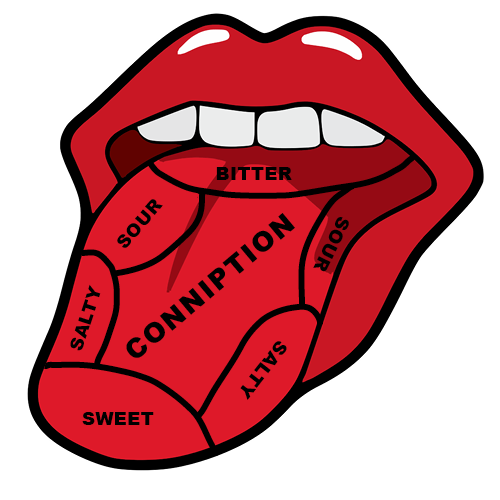If You've ever ordered a martini, you've heard the request, "Gin or Vodka?" and you may have wondered aloud, "which is best?"
Here's the short answer, 'it's a matter of taste.' It's more about your personal preference than our judgment. Although we specialize in gin, we can't talk about martinis, gin, or vodka without recognizing that vodka is the preferred choice for most people in the U.S. But it's worth exploring why this hasn't always been the norm ... and truly, why so many vodka drinkers are converted to gin lovers with Conniption.
We all taste things differently, which is why there are 11,381 types of hot sauce, and over 6,000 gins produced worldwide. Ever wondered why some people have a love-hate relationship with cilantro? Well, blame it on our individual DNA sequences! Our DNA is like a personal chef, cooking up messages for our brains about how we perceive taste and smell. So, whether cilantro is a divine herb or a sudsy bar of soap is all determined by our genetic instructions!
Whether or not we like the taste of something is also impacted by our experiences. The first question we ask on a tour here at the distillery is: “Have you had a bad gin experience?”
Ever wondered about that peculiar question that never fails to make people raise their eyebrows? Believe it or not, over 50% of folks admit to raising their hands. Every single time. So yeah, back in the college days, when we decided to go for the inexpensive gin and mixed it with Sprite (of all things), it didn't quite bring back the fondest of memories. Nah, what we recall is that not-so-great feeling of indulging in low-quality booze. But hey, let's own it without any regrets!
How Do We Move Ahead to Rediscover A Love of Gin?
Well, your taste buds are the answer. Just as you can now afford those higher shelf gins, the 10-thousand taste buds lolling about on our tongues, (bonus points if you knew that they are also located on the roof of the mouth and back of the throat) change the way we taste as we age.
When we were young, taste buds replaced themselves every two weeks. But as we do not judge by taste buds alone, as we sip a [Negroni], chemicals travel up to our nose, moving in on the olfactory sensors, and this heady combination creates our perception of taste. As we get older, not all of those taste buds revive themselves, and by the time we hit retirement age, we might be batting around maybe 5,000. This helps explain why we hated coffee when we took a sip from our parent’s mug at age six and now can’t go by that fancy coffeehouse without craving it.

Are you wondering if the tongue map is legit? Apparently, there's this idea that different parts of our tongues specialize in different flavors: salty, sweet, sour, and bitter. But hold on! It turns out that theory was debunked - and get this, by a psychologist named Professor Boring! (No, seriously, that's his name!) So, the artists who illustrated the original 1901 theory and later versions in Boring's book took some creative liberties. They made it seem like certain areas were super sensitive to specific tastes, when in reality, every part of your tongue can pick up on all flavors to some extent.
So let's Get Back to the Fundamental Questions at Hand: Gin Or Vodka? Are They The Same? How Are They Different?
Gin, with its predominant flavor derived from juniper berries, will have a slightly woodsy, peppery taste. It has a known presence on the palette and juniper’s strength is solely from that particular category and brand of gin you are drinking -- and even more explicitly what that gin distiller wanted to focus on, especially with selecting the other ingredients or botanicals to complement.
Today, Gin is not just the London Dry Style that you recall from your grandparents’ liquor cabinet. In fact, there are more styles of gin than many realize including compound, contemporary, matured (aged), old tom, sloe, and navy strength. Today’s gin distillers explore an infinite range of botanical blends and distillation techniques for flavor nuance and cocktail versatility. Conniption gins are categorized as contemporary gins.
Vodka, on the other hand, is judged by its neutrality. Think of it as the Switzerland of spirits. It’s there but more often than not, it isn’t meant to impart a specific taste in a cocktail (do not confuse with flavored vodkas as those are a different category all together and are meant to be flavorful). Vodka is not meant to have much character. That isn’t to say that there aren’t taste preferences of vodka, especially if it is made from corn or potato or even from grapes. But is vodka discernable in cocktails? We may raise some debate here but no, it really isn’t. Vodka is mainly a vehicle for alcohol in cocktails – and that’s the taste difference here between a martini with gin or a martini with vodka.
Did you know? Both gin and vodka are lower in congeners (a substance produced during fermentation) than whiskey or bourbon which translates to less intense hangovers. Just think, “clear liquor equals less hangover. The darker the liquor the darker the dawn.”




